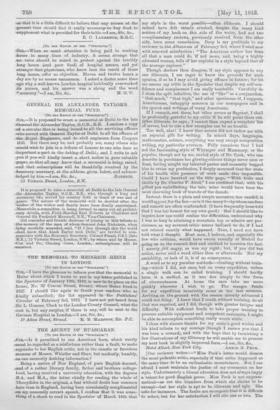"THE TREATMENT OF NURSES." [To THE EDITOR OF TEl "
SPECTATOR."]
Sin,—In a letter under the above heading "Two Nurses" refer• to your kind notice of my book "A Nurse's Life in War and Peace," and from their letter one would infer that I had spoken of nurses during my training as being "cruelly under- fed."
I think the "Two Nurses" must have read the review, but not the book, or they could hardly have used those words. At the Children's Hospital (more than twenty years ago) it is. quite true that I not infrequently had nothing but dry bread. for breakfast ; but in those days we rather scorned to talk of our discomforts ; we certainly had not time to write to the- Spectator about them ; and I think I can hardly be accused of " laying especial stress" on the fact. At the General Hospital (where I continued my training) I think I remarked that the food was good and sufficient.
In later years, as a Matron, I have made a special study of the nurses' food, and I must frankly own that I know there is. much room for improvement in many of our hospitals, and I believe that the health of the nurses might be improved by as more generous diet. Allow me to state the three principal reasons why the food for the staff is often indifferent.
(1) The hospitals are insufficiently supported by the public, and are always hard up : rigid economy cannot be practised upon the sick, so it is sometimes brought to bear upon the staff. (2) The hospitals must be economically run, or they are liable to lose the support of the King Edward's Hospital. Fund. (3) The Matron, who is supremely responsible for the catering, is often a very much overworked individual. (1 can say this without prejudice because I am now on the shelf,. as far as active hospital work goes, owing to illness.) I must restrict myself to a few words on the last of these reasons.
The Matron is expected to be a specialist in the technique, of modern practical nursing, in the theoretical training of her• nurses, in the purchase and preservation of the linen and other hospital stores. She has a vast correspondence about the selection of young nurses and the future careers of her old. nurses, &c. Besides the life within her own hospital walls, she is expected to take an interest in all nursing questions oe the day, such as Pensions, Insurance, &T. I might add to her• duties ad lib., but I must conclude by returning to her duty of superintending the provision department. It is the personab attention of a capable woman to the careful purchase of sound food of a wholesome description, and in sufficient variety, and then the necessary attention to the details of clean and careful cooking and serving, which make all the difference to the• nurses. When this careful attention can be relied upon nurses can be well fed at a cost varying between 5s. and 6s. a, week per head, which few people will consider an extravagant. sum; and yet I have vivid recollections of being summoned: before my Committee when the cost rose gradually from 4s. 8d.. to 58., and their astonishment when I pointed out to them that. cake for tea once a week or biscuits for lunch (for which ad- ditions I bad previously obtained their consent) would affect. the weekly cost.
One would very much like to know in which of the largest London Hospitals "Two Nurses " can complain of such poor- food, as in all the large hospitals there is a responsible house- keeper•, and certainly the food should be good an3 sufficient,.
`leo that it is a little difficult to believe that any nurses at the present time should find it really necessary. to buy food to 4suppleinent what is provided for their table.—I am, Sir, &c.,
E. C. LAURENCE, R.R.C.











































 Previous page
Previous page